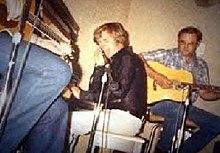Rock and roll is a genre of popular music that evolved in the United States during the late 1940s and early 1950s. It originated from African American music such as jazz, rhythm and blues, boogie-woogie, electric blues, gospel, and jump blues, as well as country music. While rock and roll's formative elements can be heard in blues records from the 1920s and in country records of the 1930s, the genre did not acquire its name until 1954.
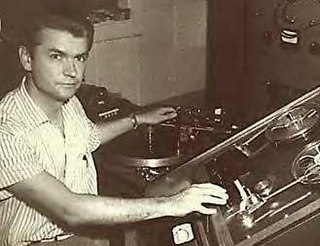
Samuel Cornelius Phillips was an American disc jockey, songwriter and record producer. He was the founder of Sun Records and Sun Studio in Memphis, Tennessee, where he produced recordings by Elvis Presley, Roy Orbison, Jerry Lee Lewis, Carl Perkins, Johnny Cash, and Howlin' Wolf. Phillips played a major role in the development of rock and roll during the 1950s, launching the career of Presley. In 1969, he sold Sun to Shelby Singleton.

Sun Records is an American independent record label founded by producer Sam Phillips in Memphis, Tennessee on February 1, 1952. Sun was the first label to record Elvis Presley, Charlie Rich, Roy Orbison, Jerry Lee Lewis, Carl Perkins, and Johnny Cash. Prior to that, Sun had concentrated mainly on African-American musicians because Phillips loved rhythm and blues and wanted to bring it to a white audience.

Carl Lee Perkins was an American guitarist, singer and songwriter. A rockabilly great and pioneer of rock and roll, he began his recording career at the Sun Studio, in Memphis, beginning in 1954. Among his best-known songs are "Blue Suede Shoes", "Honey Don't", "Matchbox" and "Everybody's Trying to Be My Baby".

Winfield Scott Moore III was an American guitarist who formed The Blue Moon Boys in 1954, Elvis Presley's backing band. He was studio and touring guitarist for Presley between 1954 and 1968.
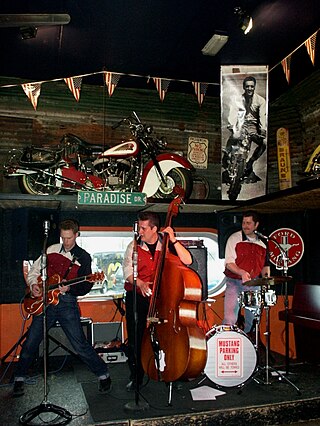
Rockabilly is one of the earliest styles of rock and roll music. It dates back to the early 1950s in the United States, especially the South. As a genre, it blends the sound of Western musical styles such as country with that of rhythm and blues, leading to what is considered "classic" rock and roll. Some have also described it as a blend of bluegrass with rock and roll. The term "rockabilly" itself is a portmanteau of "rock" and "hillbilly", the latter a reference to the country music that contributed strongly to the style. Other important influences on rockabilly include western swing, boogie-woogie, jump blues, and electric blues.

William Patton Black Jr. was an American musician and bandleader who is noted as one of the pioneers of rock and roll. He played in Elvis Presley's early trio, The Blue Moon Boys. Black later formed Bill Black's Combo.
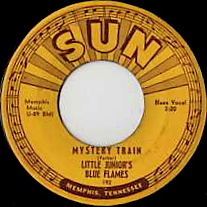
"Mystery Train" is a song written and recorded by American blues musician Junior Parker in 1953. Originally performed in the style of a Memphis blues or rhythm and blues tune, it was inspired by earlier songs and later became a popular rockabilly song, as first covered by Elvis Presley, then numerous others.

Floyd Cramer was an American pianist who became famous for his use of melodic "whole-step" attacks. He was inducted into both the Country Music Hall of Fame and the Rock and Roll Hall of Fame. His signature playing style was a cornerstone of the pop-oriented "Nashville sound" of the 1950s and 1960s. Cramer's "slip-note" or "bent-note" style, in which a passing note slides almost instantly into or away from a chordal note, influenced a generation of pianists. His sound became popular to the degree that he stepped out of his role as a sideman and began touring as a solo act. In 1960, his piano instrumental solo, "Last Date" went to number two on the Billboard Hot 100 pop music chart and sold over one million copies. Its follow-up, "On the Rebound", topped the UK Singles Chart in 1961. As a studio musician, he became one of a cadre of elite players dubbed the Nashville A-Team and he performed on scores of hit records.

Paul Burlison was an American pioneer rockabilly guitarist and a founding member of The Rock and Roll Trio. Burlison was born in Brownsville, Tennessee, where he was exposed to music at an early age. After a stint in the United States Military, Burlison teamed up with Johnny and Dorsey Burnette to form The Rock and Roll Trio. The band released several singles, but failed to attain chart success. Paul is sometimes credited with being the first guitarist to intentionally record with a distorted electric guitar on the 1956 recordings, "Lonesome Train on a Lonesome Track" and "Honey Hush." The trio disbanded in the fall of 1957 and Burlison moved back to Tennessee to start a family. There he started his own electrical subcontracting business which he ran faithfully for twenty years, taking a break when the trio reunited in the early 1980s. He released his only solo album in 1997, which received positive reviews. Burlison remained active in the music scene until his death in 2003.
The Crackerjacks were a 1960s Memphis garage rock group. Band members included organist-bassist Bobby Sowell, lead guitarist David Preola, lead singer Jerry Stamson, and drummer Roy Yeager. They gained popularity in 1966–67, regularly appearing on Memphis WHBQ TV Talent Party with George Klien. They won the Mid-South Fair in 1966 for best group. The Crackerjacks had no bass player; Bobby Sowell played bass and organ at the same time. The group was short lived due to several reasons. Sowell was drafted in 1968, Preola also was drafted into the Army, Stampson went into the restaurant business and Yeager went with the group Lobo and the southern rock band Atlanta Rhythm Section. Sowell was inducted into the Rockabilly Hall of Fame in 2002. The Crackerjacks are featured in a rock book, History of Memphis Bands, 1960-72 by Ron Hall, available at bookstores.

Elvis Is Back! is the fourth studio album by American singer Elvis Presley, released on April 8, 1960 by RCA Victor. It was Presley's first album of new material since 1958's King Creole soundtrack, as well as his first to be recorded and released in stereophonic sound. The album marked Presley's return to music after his discharge from the U.S. Army.
"Susie Q" is a rockabilly song co-written and performed by American musician Dale Hawkins released in 1957. The song was a commercial success and became a classic of the early rock and roll era, being recorded by many other performers in subsequent years.

The TCB Band is a group of musicians who formed the rhythm section of Elvis Presley's band from August 1969 until his death in 1977. The initials TCB stand for Taking Care of Business, a personal motto Presley adopted in the early 1970s. Although personnel changed over the years, the original members were James Burton, Jerry Scheff (bass), John Wilkinson, Larry Muhoberac (keyboards) and Ron Tutt (drums). They first appeared live at Presley's first Las Vegas performance at what was then known as the International Hotel on July 31, 1969.
This article includes an overview of the major events and trends in popular music in the 1950s.
The Snearly Ranch Boys were a band that formed around 1950 in Memphis, Tennessee. The band was a launching platform for many of the musicians who contributed to the Memphis music scene that revolved around Sam Phillips and Sun Records. Members of the Snearly Ranch Boys included Bill Black, Jim Stewart, Jerry Lee Lewis, Reggie Young, Ace Cannon, Barbara Pittman, and Johnny Benero. A later version of the Ranch Boys centering on steel guitarist, Stan Kesler and drummer, Clyde Leoppard, who became a part of the Sun Studio session band, recording for numerous Sun artists.

"Birth of Rock and Roll" is a 1986 song written by Carl Perkins and Greg Perkins. The song was featured on the Class of '55 album which included performances with Johnny Cash, Roy Orbison, and Jerry Lee Lewis. "Birth of Rock and Roll" was released as a 7" single with a picture sleeve, 885 760–7, on the Smash/America label copyrighted by PolyGram Records produced by Chips Moman. The single reached No. 31 on the Billboard country chart and No. 44 on the Canadian country chart in 1986. The B side was "Rock and Roll (Fais-Do-Do)" which featured Johnny Cash, Jerry Lee Lewis, and Roy Orbison. The theme of the song “Birth of Rock and Roll" is about how "Memphis gave birth to rock and roll" in the 1950s at Sun Records. A video of the song was also made featuring Carl Perkins, Jerry Lee Lewis, and Ronnie Wood of The Rolling Stones as they drove to the historic Sun studios in Memphis, Tennessee in a white Cadillac convertible.
Stanley Augustus Kesler was an American musician, record producer and songwriter, whose career began at the Sun Studio in Memphis, Tennessee. He co-wrote several of Elvis Presley's early recordings including "I'm Left, You're Right, She's Gone" and "I Forgot to Remember to Forget", and played guitar and bass on hit records by Carl Perkins and Jerry Lee Lewis. As a producer, his successful records included "Wooly Bully" by Sam the Sham and the Pharaohs.
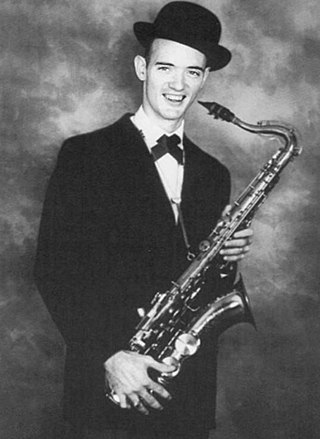
William Martin Willis Jr. was an American rockabilly rock and roll musician, composer, and arranger who played the saxophone, clarinet, and flute as a member of several bands in the 1950s and 1960s. Throughout his career, Willis traveled and recorded with several musicians, including Conway Twitty, Charlie Rich, Roy Orbison, Jerry Lee Lewis, Billy Lee Riley, Eddie Cash, Johnny Bernero, Narvel Felts, Roland Janes, Barbara Pittman, and the Bill Black Combo. He was an original Sun Studio session musician and is a member of the Rockabilly Hall of Fame.
